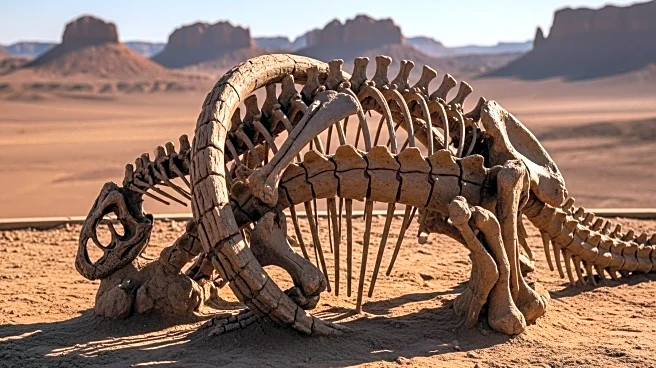What's Happening?
Scientists have discovered a new species of dinosaur, Joaquinraptor casali, in Argentina. This dinosaur, classified as a megaraptoran, was found fossilized with a crocodile-like creature's bone in its mouth, suggesting it was in the middle of a meal when it died. The discovery was made in the Lago Caolhue Huapi rock formation in Patagonia, where researchers recovered a remarkably complete specimen, including a skull, arm, leg, and portions of tail bones. Joaquinraptor casali, estimated to be 23 feet long, lived during the Late Cretaceous period, approximately 66 to 70 million years ago. The findings, published in Nature, highlight the dinosaur's massive claws, which were likely used for predation, distinguishing it from other predatory dinosaurs like the T-Rex and Velociraptor.
Why It's Important?
The discovery of Joaquinraptor casali is significant as it provides one of the most complete skeletons of megaraptorans, filling a major gap in the understanding of these apex predators. Megaraptorans were known to dominate the central and southern Patagonian paleoecosystems towards the end of the Cretaceous period. The close association of a crocodyliform humerus with the dinosaur's remains offers insights into the dietary preferences and feeding strategies of Megaraptoridae. This discovery enhances the understanding of the evolutionary timeline and ecological roles of megaraptorans, contributing to the broader knowledge of dinosaur biodiversity and behavior during the Late Cretaceous period.
What's Next?
Further research is expected to explore the hunting strategies and ecological impact of Joaquinraptor casali and other megaraptorans. Scientists may conduct additional excavations in Patagonia to uncover more specimens and gather data on the paleoenvironmental conditions that supported these apex predators. The findings could lead to a reevaluation of the predatory dynamics in prehistoric ecosystems, particularly in regions where tyrannosaurs were absent.
Beyond the Headlines
The naming of Joaquinraptor casali in honor of the lead scientist's son, Joaquin, adds a personal dimension to the discovery. This gesture reflects the emotional connection and legacy that scientific discoveries can carry, highlighting the human aspect behind paleontological research. The discovery also underscores the importance of preserving fossil sites and supporting scientific endeavors that contribute to the understanding of Earth's ancient history.









